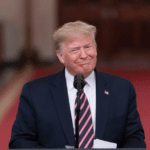




Secretary of State Marco Rubio just slammed the door on Palestinian leaders’ hopes of grandstanding at the United Nations.
Fox News reported that Rubio denied visas to the entire Palestinian Authority (PA) and Palestine Liberation Organization (PLO) delegation, including PA President Mahmoud Abbas, for the September 2025 General Assembly. This bold move signals a no-nonsense stance against policies that undermine U.S. interests.
Rubio’s decision, rooted in U.S. laws, blocks Palestinian officials from using the U.N. platform to push for unilateral statehood recognition.
The State Department cites the PA’s “pay for slay” payments to terrorists and their defiance of U.S. sanctions as key reasons. It’s a sharp departure from decades of diplomatic tiptoeing.
The visa ban stems from findings under the Palestinian Liberation Organization Commitments Compliance Act and the Middle East Peace Commitments Act.
These laws flagged the PA and PLO for glorifying violence, promoting antisemitism, and supporting terrorism. Rubio’s not playing games with groups that thumb their noses at peace commitments.
“In compliance with U.S. laws and national security interests, Secretary Rubio is denying and revoking visas for PLO and PA members,” said State Department spokesperson Tommy Pigott. That’s a polite way of saying the U.S. won’t roll out the red carpet for those cozying up to terrorists. The sanctions mandate a 180-day visa freeze, no exceptions.
Pigott added that the PA must “repudiate terrorism” and abandon “lawfare” at international courts before being taken seriously.
It’s a stinging rebuke, but one that demands accountability over empty promises. The U.S. isn’t here to coddle groups that bankroll violence while demanding legitimacy.
This isn’t just about symbolism; it’s a calculated strike. U.S. guidance warns that Palestinian leaders planned a “constitutional declaration” of independence at the U.N., a move seen as a propaganda win for Hamas. Rubio’s visa ban aims to choke off that narrative before it gains traction.
The U.S. has never barred an entire delegation from the General Assembly before now. While individual visa denials, like those for Iranian officials, have happened, this blanket ban is historic. It’s a clear signal that the Trump administration isn’t afraid to ruffle diplomatic feathers.
Under the U.N. Headquarters Agreement, the U.S. pledges not to obstruct travel for official U.N. business. But Rubio’s team argues that the PA’s statehood push isn’t routine—it’s a direct challenge to U.S. policy. This legal tightrope walk shows guts, even if it sparks U.N. grumbling.
An exception was carved out for permanent staff at the Palestinian U.N. Observer Mission. They can stay, honoring U.S. obligations to the U.N. But for Abbas and his entourage, the door is firmly shut, no waivers allowed.
Rubio’s decision follows years of U.S.-U.N. tensions over Israel-related issues, especially after the Hamas attack on October 7, 2023. The U.S. has repeatedly used its Security Council veto to shield Israel from biased resolutions. This visa ban doubles down on that protective stance.
Since 2012, Palestinians have held non-member observer status at the U.N., letting them join debates but not vote. They’ve used this platform to push statehood, often bypassing direct talks with Israel. Rubio’s move undercuts their ability to exploit that status for political theater.
Internal U.S. documents call the visa ban a “low-cost, high-impact” way to reinforce policy. It’s a diplomatic jab that hits hard without firing a shot. Critics might cry foul, but it’s hard to argue with prioritizing national security.
House Democrats have urged Rubio to allow injured Gaza children into the U.S. despite the visa halt. It’s a fair point—humanitarian needs shouldn’t be caught in diplomatic crossfire. But Rubio’s focus remains on holding PA leaders accountable, not punishing civilians.
The State Department insists that granting waivers would weaken existing sanctions. It’s a tough call, but letting Abbas waltz into New York could embolden more anti-Israel stunts. The U.S. is signaling that peace talks, not U.N. speeches, are the path forward.



